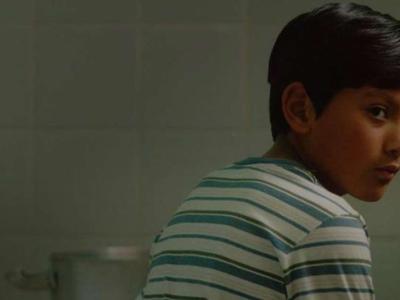Set during one of the bloodiest years of the Chilean dictatorship, a privileged housewife, Carmen, renovating the beach house in Chile, finds her life turned upside down when she is asked to clandestinely care for a wounded activist.
Carmen (a superb Aline Kuppenheim), who has been pressured by her family to give up her dreams of medical studies to marry a doctor, Miguel (Alejandro Goic), is now trying to live up to the rigid patriarchal expectations of the Chilean society of the time, as a bourgeoise housewife and mother. Anxiously chain-smoking and popping pills at every turn, she quietly struggles to keep up an appearance of being unruffled, poised and calm, surrounded by a pervading awareness that women are irrelevant in her world.
A well- to -do woman in that society was destined to keep her nose clean, keep to charity work with the church and stay at home to keep an eye on the children and the beach house renovations while her husband is at work. All the while, Carmen exudes a reluctant acceptance of her lot.

As Carmen is carefully selecting a new wall-paint colour at the local store, Martelli throws us into the reality of the political situation as a person is brutally kidnapped in the street outside the shop. As Carmen departs, the victim’s lost shoe lies discarded by her car, but she seems more concerned with loading up her newly-mixed paint for the living room of the family’s summer beach house.

With the essential help of her dutiful maid Estela (Carmen Gloria Martínez) Carmen deals with her ungrateful family that turn up with much fanfare and leave her to care for the grandchildren. Her comfortable life and her values are challenged and altered when she is approached for some unusual assistance by the local priest, Father Sánchez (Hugo Medina) a close family friend whom she trusts.
She unquestioningly accepts his request to clandestinely nurse for a young man, Elías (Nicolás Sepúlveda), who has been shot and wounded, believing him to be a common criminal. As the lad’s true role in the political arena gradually emerges, her existence is filled with conflicted emotions and fears she can barely understand. Being a religious and conservative person, Carmen is no revolutionary, but having decided to help, she finds herself drawn into putting herself at risk as she tries to obtain essential medicines for her injured patient.

As tensions build around her, Carmen has to find reasons for disappearing to deal with her task. Her family and her maid notice her frequent late arrivals in the evenings and she is overwhelmed with a paranoia that she is being followed and starts to mistrust everyone. This is exacerbated by murdered bodies being washed up onto the beach as Carmen drives by with the grandchildren. Despite being torn by paranoia and ambiguous feelings, Carmen remains determined not to forsake her promise to the priest.
Aline Kuppenheim’s performance as Carmen is very convincing. With minimal body language, we can feel the weight on her shoulders, mixed with a stoic weariness, as she tries to lead the life that is expected of her in this patriarchal society. The cost to her & her conscience is palpable, as is the feeling of dread that pervades every scene. There is little melo or high drama, yet every scene in instilled with a growing and insidious sensation of powerlessness before an unseen and invisible enemy. While playing the housewife whose only concerns are volunteering, reading to the blind and working on the house renovations, she quietly takes risks as her paranoia builds.

Having had all her own dreams frustrated, Carmen relishes that, for once, she is finally really needed and it empowers her, pulling her out of her elegant, privileged but ultimately empty life. Manuela Martelli has created a subtle but powerful mise- en-scène around her characters. She has immersed her protagonist Carmen in the misogynistic, patriarchal society of Chile in the 1970s, where the husband Miguel is also revealed as a Pinochet collaborator. The experimental sound design by María Portugal adds a disturbing layer adding to the feelings of claustrophobia.
Martelli also introduces subtle visual throwaways, such as newspaper headlines, black & white TV images and car radio broadcasts that spew chilling instructions to the population. Carmen appears to barely notice what is going on around her, but the atmospheric tension and the dread continues to builds up steadily, till we all know that stepping out of line in Chile, could well mean death.
Will Carmen’s privileged position in society help her or expose her to even greater dangers?
1976 is out on Friday. Click here for your nearest screening
CREDITS
Writer/ director: Manuela Martelli / Co-writer: Alejandra Moffat/ Producers: Alejandro García, Juan Pablo Gugliotta, Dominga Sotomayor & Andrés Wood /Camera: Soledad Rodríguez / Music: María Portugal / Editor: Camila Mercadal.
CAST: Carmen: Aline Kuppenheim / Elías: Nicolás Sepúlveda / Miguel: Alejandro Goic / Padre Sánchez: Hugo Medina / Estela: Carmen Gloria Martínez /















